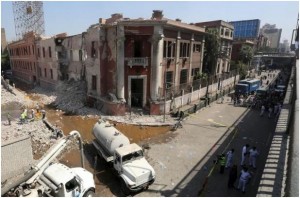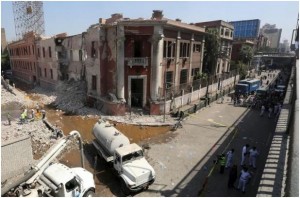CAIRO, February 16: On January 21, days before the fifth anniversary of Egypt’s fabled revolution, police in Cairo raided a slum in the crowded Ahram neighborhood. Booby-trapped bombs went off in a scene more reminiscent of Fallujah, Iraq, than Egypt’s capital. Six officers and three civilians were killed, and an entire floor of the mid-size apartment block was leveled. The bombing was the latest in a string of attacks claimed by a new Islamic State group that calls itself “Misr” – or “Egypt” in Arabic.
The Misr network is an ominously peculiar militant creation. It is not designated as an official “province,” an Islamic State-controlled territory, or wilaya, like the group’s Sinai and Libyan counterparts. Yet Misr’s name and the ability of its cells to regroup after being hit hard by police suggest that this offshoot of the world’s most powerful jihadist group is out to threaten stability in Egypt’s heartland. If ignored, it may well achieve it.
Meanwhile, the Sisi regime is continuing its relentless purges of any traces of the once influential Muslim Brotherhood. Like the Cairo police raid, however, the repercussions of the government’s actions could be far worse than expected. Because President Abdel Fattah al-Sisi might ultimately deliver thousands of disillusioned Islamists into the toxic ideological embrace of Islamic State’s “caliphate.”
Misr launched with a car bombing against the Italian consulate in Cairo, in July 2015. It again drew public attention the following month, with a bomb so powerful it was heard across the Cairo megalopolis. The target was the Qalubiya Province Security Directorate, just north of the capital.
Though its Sinai counterpart stole the headlines, Misr has since carried out more than 10 sophisticated attacks in Egypt’s highly defended capital, hitting symbols of power as well as tourism attractions.
Over the seven months since its creation, Misr has moved from sophisticated one-off bombings to more frequent, yet simpler attacks. It’s a worrying shift in modus operandi that indicates an effort to ignite and maintain a low-level insurgency in the neighborhoods once dominated by the disintegrating Muslim Brotherhood. These attacks and their targets actually bear a striking semblance to those carried out by violent Muslim Brotherhood offshoots, known as “Popular Committees,” in the year after Islamist President Mohammed Morsi’s ouster in 2013.
Skeptics of Islamic State’s potential in Egypt argue that Sisi’s rise to power demonstrates the wider public’s fierce nationalism and its strong support for the military. These attitudes, they argue, will prevent Islamic State from ever being able to take root in Egypt, as it has in the Sinai Peninsula and in Libya. In the five years since Arab Spring protests ousted President Hosni Mubarak, however, Sisi’s crackdown has virtually demolished the marketplace for dissenting political activism. It has created a dangerous ideological vacuum that Islamic State now threatens to fill.-Reuters
- Latest
- Trending




